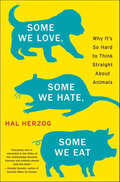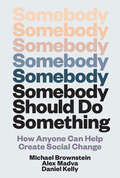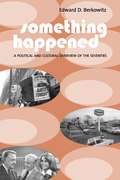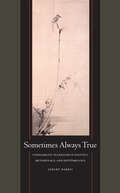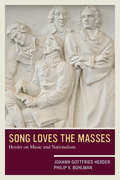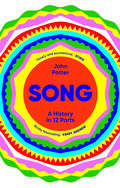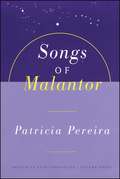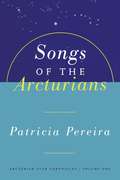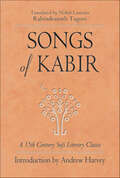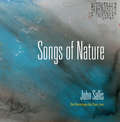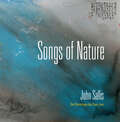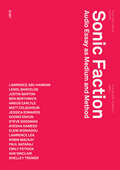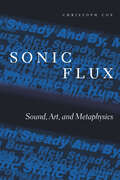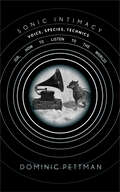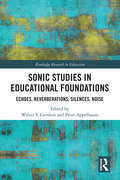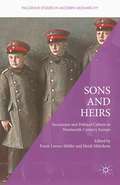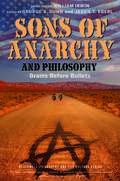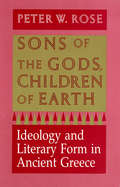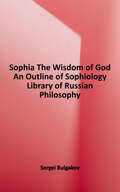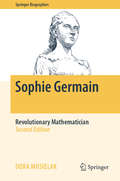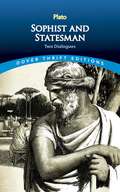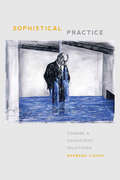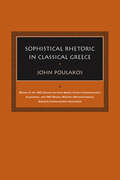- Table View
- List View
Some We Love, Some We Hate, Some We Eat: Why It's So Hard to Think Straight About Animals
by Hal Herzog“Everybody who is interested in the ethics of our relationship between humans and animals should read this book.”—Temple Grandin, author of Animals Make Us HumanHal Herzog, a maverick scientist and leader in the field of anthrozoology offers a controversial, thought-provoking, and unprecedented exploration of the psychology behind the inconsistent and often paradoxical ways we think, feel, and behave towards animals. A cross between Michael Pollan’s The Omnivore’s Dilemma and Bill Bryson’s A Walk in the Woods, Some We Love, Some We Hate, Some We Eat, in the words of Irene M. Pepperberg, bestselling author of Alex & Me, “deftly blends anecdote with scientific research to show how almost any moral or ethical position regarding our relationship with animals can lead to absurd consequences.”
Somebody Should Do Something: How Anyone Can Help Create Social Change
by Daniel Kelly Alex Madva Michael BrownsteinA novel and scientific approach to creating transformative social change—and the surprising ways that each of us can help make a real difference.Changing the world is difficult. One reason is that the most important problems, like climate change, racism, and poverty, are structural. They emerge from our collective practices: laws, economies, history, culture, norms, and built environments. The dilemma is that there is no way to make structural change without individual people making different—more structure-facing—decisions. In Somebody Should Do Something, Michael Brownstein, Alex Madva, and Daniel Kelly show us how we can connect our personal choices to structural change and why individual choices matter, though not in the way people usually think.The authors paint a new picture of how social change happens, arguing that our most powerful personal choices are those that springboard us into working together with others—warehouse worker Chris Smalls&’s unionization at Amazon is one powerful example. Taking inspiration from the writer Bill McKibben, they stress how one &“important thing an individual can do is be somewhat less of an individual.&”Organized into three main parts, the book first diagnoses the problem of &“either/or&” thinking about social change, which stems from the false choice of making better personal choices or changing the system. Then it offers a different way to think about social change, anchored in a new picture of human nature emerging across the social sciences. Finally, the authors explore ways of putting this picture into practice. Neither a how-to manual nor an activist&’s guide, Somebody Should Do Something pairs stories with science (plus some jokes) to help readers recognize their own power, turning resignation about climate change and racial injustice into actions that transform the world.
Someone Has to Fail: The Zero-Sum Game of Public Schooling
by David F. LabareeWhat do we really want from schools? Only everything, in all its contradictions. Most of all, we want access and opportunity for all children—but all possible advantages for our own. So argues historian David Labaree in this provocative look at the way “this archetype of dysfunction works so well at what we want it to do even as it evades what we explicitly ask it to do.” Ever since the common school movement of the nineteenth century, mass schooling has been seen as an essential solution to great social problems. Yet as wave after wave of reform movements have shown, schools are extremely difficult to change. Labaree shows how the very organization of the locally controlled, administratively limited school system makes reform difficult. At the same time, he argues, the choices of educational consumers have always overwhelmed top-down efforts at school reform. Individual families seek to use schools for their own purposes—to pursue social opportunity, if they need it, and to preserve social advantage, if they have it. In principle, we want the best for all children. In practice, we want the best for our own. Provocative, unflinching, wry, Someone Has to Fail looks at the way that unintended consequences of consumer choices have created an extraordinarily resilient educational system, perpetually expanding, perpetually unequal, constantly being reformed, and never changing much.
Something Happened: A Political and Cultural Overview of the Seventies
by Edward BerkowitzIn both the literal and metaphorical senses, it seemed as if 1970s America was running out of gas. The decade not only witnessed long lines at gas stations but a citizenry that had grown weary and disillusioned. High unemployment, runaway inflation, and the energy crisis, caused in part by U.S. dependence on Arab oil, characterized an increasingly bleak economic situation. As Edward D. Berkowitz demonstrates, the end of the postwar economic boom, Watergate, and defeat in Vietnam led to an unraveling of the national consensus. During the decade, ideas about the United States, how it should be governed, and how its economy should be managed changed dramatically. Berkowitz argues that the postwar faith in sweeping social programs and a global U.S. mission was replaced by a more skeptical attitude about government's ability to positively affect society.From Woody Allen to Watergate, from the decline of the steel industry to the rise of Bill Gates, and from Saturday Night Fever to the Sunday morning fervor of evangelical preachers, Berkowitz captures the history, tone, and spirit of the seventies. He explores the decade's major political events and movements, including the rise and fall of détente, congressional reform, changes in healthcare policies, and the hostage crisis in Iran. The seventies also gave birth to several social movements and the "rights revolution," in which women, gays and lesbians, and people with disabilities all successfully fought for greater legal and social recognition. At the same time, reaction to these social movements as well as the issue of abortion introduced a new facet into American political life-the rise of powerful, politically conservative religious organizations and activists.Berkowitz also considers important shifts in American popular culture, recounting the creative renaissance in American film as well as the birth of the Hollywood blockbuster. He discusses how television programs such as All in the Family and Charlie's Angels offered Americans both a reflection of and an escape from the problems gripping the country.
Sometimes Always True: Undogmatic Pluralism in Politics, Metaphysics, and Epistemology
by Jeremy BarrisSometimes Always True aims to resolve three connected problems. First, we need an undogmatic pluralist standpoint in political theory, metaphysics, and epistemology. But genuine pluralism suffers from the contradiction that making room for fundamental differences in outlook means making room for outlooks that exclude pluralism.Second, philosophy involves reflecting on the world and meaning as a whole, yet this means adopting a vantage point in some way outside of meaning.Third, our lived experience of the sense of our lives similarly undermines its own sense, as it involves having a vantage point in some way wholly outside ourselves.In detailed engagement with, among others, Davidson, Rorty, Heidegger, Foucault, Wilde, and gender and sexuality theory, the book argues that these contradictions are so thoroughgoing that, like the liar’s paradox, they cancel the bases of their own meaning. Consequently, it argues, they resolve themselves and do so in a way that produces a vantage point on these issues that is not dogmatically circular because it is, workably, both within and outside these issues’ sense. The solution to a genuinely undogmatic pluralism, then, is to enter into these contradictions and the process of their self-resolution.
Song Loves the Masses: Herder on Music and Nationalism
by Philip V. Bohlman Johann Gottfried HerderDistinguished ethnomusicologist Philip V. Bohlman compiles Johann Gottfried Herder’s writings on music and nationalism, from his early volumes of Volkslieder through sacred song to the essays on aesthetics late in his life, shaping them as the book on music that Herder would have written had he gathered the many strands of his musical thought into a single publication. Framed by analytical chapters and extensive introductions to each translation, this book interprets Herder’s musings on music to think through several major questions: What meaning did religion and religious thought have for Herder? Why do the nation and nationalism acquire musical dimensions at the confluence of aesthetics and religious thought? How did his aesthetic and musical thought come to transform the way Herder understood music and nationalism and their presence in global history? Bohlman uses the mode of translation to explore Herder’s own interpretive practice as a translator of languages and cultures, providing today’s readers with an elegantly narrated and exceptionally curated collection of essays on music by two major intellectuals.
Song: A History in 12 Parts
by John PotterFrom one of our most innovative singers, a vibrant history of song stretching from Hildegard von Bingen and Benjamin Britten to Björk &“Songs can be intensely personal (whether you hear them or sing them) and none of us would choose the same twelve songs as anyone else. My choices are based on decades of performing experience in many different genres, but I hope they will reveal aspects of our common humanity as the story evolves from the Middle Ages to the present.&” In this celebratory account, author and singer John Potter tells the European story of song. The form has captivated audiences and excited performers for centuries, from the music of the troubadours and the Christian liturgy through classical composers such as Bach and Schumann up to Britten, Berio, and the rise of popular music. Choosing twelve key works, Potter offers a personal tour through this vital tradition, from John Dowland&’s &“Flow My Tears&” to George Gershwin&’s &“Summertime.&” Throughout, he reveals who wrote and sang these joyful masterpieces—and what they mean to singers and audiences today.
Songs Of Malantor: The Arcturian Star Chronicles Volume Three (The Arcturian Star Chronicles)
by Patricia PereiraIn 1987, medical transcriptionist Patricia Pereira suddenly started receiving telepathic communications from the star Arcturus and was requested to begin a series of galactically inspired manuscripts. The mission of this series of books is to awaken us to our individual and collective spiritual obligation for the health and well-being of our planet and all creatures who live upon her. Philosophical in cope, the essays in these books provide pragmatic, practical suggestions for emotional, mental physical, and spiritual transformation. They remind us of our familial relationships to beings of light who inhabit the great star nations. Songs of Malantor offers cosmic information of expanded complexity to assist humans in the times of change and to prepare them for citizenship in the greater galactic community. Malantor is best describes as a fifth- and sixth-dimensional being of light from Arcturus, the primary star of the Boötes system. Malantor is a creator of melodious lyrics, an Arcturian poet and intergalactic counselor-teacher who volunteered for Earth assignment. He resides on board the Intergalactic Brotherhood’s principal mother ship, Marigold—City of Lights.
Songs Of The Arcturians: Arcturian Star Chronicles Book 1 (The Arcturian Star Chronicles)
by Patricia PereiraIn 1987, medical transcriptionist Patricia Pereira suddenly started receiving telepathic communications from the star Arcturus and was requested to begin a series of galactically inspired manuscripts. The mission of this series of books is to awaken us to our individual and collective spiritual obligation for the health and well-being of our planet and all creatures who live upon her. Philosophical in cope, the essays in these books provide pragmatic, practical suggestions for emotional, mental physical, and spiritual transformation. They remind us of our familial relationships to beings of light who inhabit the great star nations. This book, the first in a series of four, provides practical suggestion to help us shift our emotional, physical, and spiritual states so that we can prepare to take our future place in the Universal Community.
Songs of Kabir: A 15th Century Sufi Literary Classic
by Rabindranath Tagore and Andrew HarveyThe poet Kabir, one of the most intriguing and celebrated personalities in the history of Indian mysticism, lived in the fifteenth century. He was a great religious reformer and left behind an exquisite body of poetry of enlightenment that weaves together the philosophies of Sufism, Hinduism, and the Kabbala. These poems express a wide range of mystical experience, from the loftiest abstractions to the most intimate and personal realization of God, and have become a classic Sufi text.
Songs of Nature: On Paintings by Cao Jun (The Collected Writings of John Sallis #1, 24)
by John SallisThis latest philosophical text by John Sallis is inspired by the work of contemporary Chinese painter Cao Jun. It carries out a series of philosophical reflections on nature, art, and music by taking up Cao Jun's art and thought, with a focus on questions of the elemental. Sallis's reflections are not a matter of simply relating art works to philosophical thought, as theoretical insights and developments run throughout Cao Jun's writings and inform many of his artistic works. Sallis maintains abundant points of contact with Chinese philosophical traditions but also with Western philosophy. In these reflections on art, Sallis poses a critique of mimesis and considers the relation of painting to music. He affirms his conviction that the artist must always turn to nature, especially as reflections on the earth and sky delimit the scale and place of what is human. Full-color illustrations enhance this provocative and penetrating text.
Songs of Nature: On Paintings by Cao Jun (The\collected Writings Of John Sallis Ser. #1, 24)
by John SallisThe work of the contemporary Chinese painter prompts reflections on nature, art, and music from one of America’s leading philosophers.This text by John Sallis carries out a series of ruminations by taking up Cao Jun’s art and thought, with a focus on questions of the elemental. Sallis’s reflections are not a matter of simply relating art works to philosophical thought, as theoretical insights and developments run throughout Cao Jun’s writings and inform many of his artistic works. Sallis maintains abundant points of contact with Chinese philosophical traditions but also with Western philosophy. In these reflections on art, Sallis poses a critique of mimesis and considers the relation of painting to music. He affirms his conviction that the artist must always turn to nature, especially as reflections on the earth and sky delimit the scale and place of what is human. Full-color illustrations enhance this provocative and penetrating text.
Sonic Faction: Audio Essay as Medium and Method (Urbanomic / Redactions)
Explorations of the audio essay as medium and method.With contributors including Justin Barton, Angus Carlyle, Kodwo Eshun, Steve Goodman, Robin Mackay, Paul Nataraj, and Iain Sinclair, Sonic Faction presents extended lines of thought prompted by two Urbanomic events which explored the ways in which sound and voice can produce new sensory terrains and provoke speculative thought.Three recent pieces provide the catalyst for a discussion of the potential of the "audio essay" as medium and method, a machine for intensifying listening and unsettling the boundaries between existing forms: documentary, music, ambient sound, audiobook, field recording, radio play….Kode9&’s Astro-Darien (2022) is a sonic fiction about simulation, presenting an alternative history of the Scottish Space Programme, haunted by the ghosts of the British Empire. Justin Barton and Mark Fisher&’s On Vanishing Land (2006) is a dreamlike account of a coastal walk that expands into questions of modernity, capitalism, fiction, and the micropolitics of escape. Robin Mackay&’s By the North Sea (2021) is a meditation on time, disappearance, and loss as heard through the fictions of Lovecraft, Ccru, and the spectre of Dunwich, the city that vanished beneath the waves.Alongside photographic documentation of the events and edited transcripts of the artists&’ discussions, Sonic Faction brings together contributors with diverse perspectives to address the question of the audio essay and to imagine its future.ContributorsLawrence Abu Hamdan, Lendl Barcelos, Justin Barton, Ben Borthwick, Angus Carlyle, Matt Colquhoun, Jessica Edwards, Kodwo Eshun, Steve Goodman, Ayesha Hameed, Eleni Ikoniadou, Lawrence Lek, Robin Mackay, Paul Nataraj, Emily Pethick, Iain Sinclair, Shelley Trower
Sonic Flux: Sound, Art, and Metaphysics
by Christoph CoxFrom Edison’s invention of the phonograph through contemporary field recording and sound installation, artists have become attracted to those domains against which music has always defined itself: noise, silence, and environmental sound. Christoph Cox argues that these developments in the sonic arts are not only aesthetically but also philosophically significant, revealing sound to be a continuous material flow to which human expressions contribute but which precedes and exceeds those expressions. Cox shows how, over the course of the twentieth and twenty-first centuries, philosophers and sonic artists have explored this “sonic flux.” Through the philosophical analysis of works by John Cage, Maryanne Amacher, Max Neuhaus, Christian Marclay, and many others, Sonic Flux contributes to the development of a materialist metaphysics and poses a challenge to the prevailing positions in cultural theory, proposing a realist and materialist aesthetics able to account not only for sonic art but for artistic production in general.
Sonic Intimacy: Voice, Species, Technics (or, How To Listen to the World)
by Dominic PettmanSonic Intimacy asks us who—or what—deserves to have a voice, beyond the human. Arguing that our ears are far too narrowly attuned to our own species, the book explores four different types of voices: the cybernetic, the gendered, the creaturely, and the ecological. Through both a conceptual framework and a series of case studies, Dominic Pettman tracks some of the ways in which these voices intersect and interact. He demonstrates how intimacy is forged through the ear, perhaps even more than through any other sense, mode, or medium. The voice, then, is what creates intimacy, both fleeting and lasting, not only between people, but also between animals, machines, and even natural elements: those presumed not to have a voice in the first place. Taken together, the manifold, material, actual voices of the world, whether primarily natural or technological, are a complex cacophony that is desperately trying to tell us something about the rapidly failing health of the planet and its inhabitants. As Pettman cautions, we would do well to listen.
Sonic Studies in Educational Foundations: Echoes, Reverberations, Silences, Noise (Routledge Research in Education)
by Peter Appelbaum Walter S. GershonOriginally published as a special issue of Educational Studies, this volume demonstrates the ways in which sound considerations can significantly contribute to educational foundations. Regardless of their origin or interpretation, sounds are theoretically and practically foundational to educational experiences. As the means through which knowledges are passed from one person to another, sounds outline the fluid, porous boundaries of educational ecologies. This book draws out and expands upon the already-present sonic metaphors that exist at the center of philosophical and historical foundations of educational studies. Contributions demonstrate the ethical dimensions of this line of inquiry, emphasizing the need for education to offer both a right to speak and to be heard in order to take on a truly democratic character. By highlighting emerging attention to sound scholarship in education, contributors attend to and otherwise explore sound possibilities for educational theory, policy, and practice. This book will be of great interest to graduate and post graduate students; libraries, researchers and academics in the field of educational foundations, philosophy of education, education politics and sociology of education.
Sons and Heirs: Succession and Political Culture in Nineteenth-Century Europe (Palgrave Studies in Modern Monarchy)
by Frank Lorenz Müller Heidi MehrkensBringing together an international team of specialists, this volume considers the place of royal heirs within their families, their education and accommodation, their ability to overcome succession crises, the consequences of the death of an heir and finally the roles royal heirs played during the First World War.
Sons of Anarchy and Philosophy
by William Irwin George A. Dunn Jason T. Eberl"Brains before bullets" - ancient and modern wisdom for "mechanics and motorcycle enthusiasts"Essential reading for fans of the show, this book takes readers deeper into the Sons of Anarchy Motorcycle Club, the Teller-Morrow family, and the ethics that surround their lives and activities.Provides fascinating moral insights into Sons of Anarchy, its key characters, plot lines and ideasInvestigates compelling philosophical issues centering on loyalty, duty, the ethics of war, authority, religion and whether the ends justify the meansTeaches complex philosophical ideas in a way that's accessible to the general interest reader in order to inspire them to further reading of the great philosophersAuthors use their deep knowledge of the show to illuminate themes that are not always apparent even to die-hard fans
Sons of the Gods, Children of Earth: Ideology and Literary Form in Ancient Greece
by Peter W. RoseIn this ambitious and venturesome book, Peter W. Rose applies the insights of Marxist theory to a number of central Greek literary and philosophical texts. He explores major points in the trajectory from Homer to Plato where the ideology of inherited excellence—beliefs about descent from gods or heroes—is elaborated and challenged. Rose offers subtle and penetrating new readings of Homer's Iliad and Odyssey, Pindar's Tenth Pythian Ode, Aeschylus's Oresteia, Sophokles' Philoktetes, and Plato's Republic.Rose rejects the view of art as a mere reflection of social and political reality—a view that is characteristic not only of most Marxist but of most historically oriented treatments of classical literature. He applies instead a Marxian hermeneutic derived from the work of the Frankfurt School and Fredric Jameson. His readings focus on illuminating a politics of form within the text, while responding to historically specific social, political, and economic realities. Each work, he asserts, both reflects contemporary conflicts over wealth, power, and gender roles and constitutes an attempt to transcend the status quo by projecting an ideal community. Following Marx, Rose maintains that critical engagement with the limitations of the utopian dreams of the past is the only means to the realization of freedom in the present.Classicists and their students, literary theorists, philosophers, comparatists, and Marxist critics will find Sons of the Gods, Children of Earth challenging reading.
Sophia - The Wisdom of God: An Outline of Sophiology (Esalen Institute Lindisfarne Press Library Of Russian Philosophy)
by Sergei BulgakovThere is a great hunger to recover the feminine aspect of the Divinity. But much searching has left Christians disappointed and seeking the "Goddess" elsewhere. In this brave theological work, Bulgakov shows how the Divine Sophia, in whom all things are created, is present in the Holy Trinity itself and how, as the "creaturely Sophia," she works together with her divine counterpart in the work of the Holy Spirit for the redemption of the world.
Sophie Germain: Revolutionary Mathematician (Springer Biographies)
by Dora MusielakThis biography of the mathematician, Sophie Germain, paints a rich portrait of a brilliant and complex woman, the mathematics she developed, her associations with Gauss, Legendre, and other leading researchers, and the tumultuous times in which she lived. Sophie Germain stood right between Gauss and Legendre, and both publicly recognized her scientific efforts. Unlike her female predecessors and contemporaries, Sophie Germain was an impressive mathematician and made lasting contributions to both number theory and the theories of plate vibrations and elasticity. She was able to walk with ease across the bridge between the fields of pure mathematics and engineering physics. Though isolated and snubbed by her peers, Sophie Germain was the first woman to win the prize of mathematics from the French Academy of Sciences. She is the only woman who contributed to the proof of Fermat’s Last Theorem. In this unique biography, Dora Musielak has done the impossible―she has chronicled Sophie Germain’s brilliance through her life and work in mathematics, in a way that is simultaneously informative, comprehensive, and accurate.
Sophie Ka Sansar - Pashchatya Jagat Ki Darshan-Gatha: सोफी का संसार: पाश्चात्य जगत की दर्शन-गाथा
by Jostein Gaarder"सोफी का संसार: पश्चिमी जगत की दर्शन-गाथा" जॉस्टिन गॉरडर द्वारा लिखित एक अद्वितीय दार्शनिक उपन्यास है, जो पाठकों को दर्शनशास्त्र के इतिहास की रोमांचक यात्रा पर ले जाता है। इस पुस्तक का हिंदी अनुवाद राधाकृष्ण प्रकाशन द्वारा प्रकाशित किया गया है। कहानी की मुख्य पात्र सोफी नामक 14 वर्षीय लड़की है, जो नॉर्वे में रहती है। एक दिन उसे अपने मेलबॉक्स में एक रहस्यमय पत्र मिलता है, जिसमें लिखा होता है, "तुम कौन हो?" इस पत्र के साथ सोफी के जीवन में एक नया मोड़ आता है और वह दर्शनशास्त्र के इतिहास के अध्ययन में प्रवृत्त हो जाती है। सोफी को धीरे-धीरे और भी पत्र मिलते हैं, जो दर्शनशास्त्र के विभिन्न कालखंडों और महान दार्शनिकों के विचारों को समझाते हैं। इन पत्रों के माध्यम से सोफी प्लेटो, अरस्तू, रीनें देकार्त, स्पिनोज़ा, लॉक, कांट, हेगेल, मार्क्स, डार्विन, फ्रायड और सार्त्र जैसे महान विचारकों के दर्शन से परिचित होती है। सोफी की यात्रा में उसके गुरु, अल्बर्टो नॉक्स, महत्वपूर्ण भूमिका निभाते हैं। अल्बर्टो एक रहस्यमयी शिक्षक है, जो सोफी को व्यक्तिगत मार्गदर्शन प्रदान करते हैं और उसे दर्शनशास्त्र के गूढ़ सिद्धांतों को सरल और सुलभ रूप में समझाते हैं। जैसे-जैसे कहानी आगे बढ़ती है, सोफी को अपने अस्तित्व और वास्तविकता के बारे में नए दृष्टिकोण प्राप्त होते हैं। उसे एहसास होता है कि उसकी अपनी दुनिया भी एक बड़े रहस्य का हिस्सा है। "सोफी का संसार" एक साधारण लड़की की असाधारण दार्शनिक यात्रा को प्रस्तुत करता है। यह पुस्तक न केवल दर्शनशास्त्र के इतिहास को सरल और रोचक तरीके से समझाती है, बल्कि पाठकों को जीवन के गहन प्रश्नों पर विचार करने के लिए प्रेरित भी करती है। सोफी की यह यात्रा एक बौद्धिक और आत्म-खोज की यात्रा है, जो हर आयु वर्ग के पाठकों के लिए अत्यंत रोचक और ज्ञानवर्धक है।
Sophist and Statesman: Two Dialogues (Dover Thrift Editions)
by PlatoThese two dialogues by the greatest of the ancient Greek philosophers explore a vital concern of a democratic society: how to define the special abilities and qualities that make a genuine statesman. They further examine the distinction between an authentic statesman and the sophist, an individual who pretends to be a statesman but lacks the essential knowledge, personal qualities, and philosophical outlook. Written after Parmenides — in which the philosopher condemned his own theory of separate, immaterial forms — Sophist and Statesman are of special interest in terms of their reflection of Plato's conceptions of method and metaphysics. In addition, Statesman provides a transitional view of the author's political philosophy in the period between the Republic and the Laws. Together, the dialogues illuminate Plato's growing preoccupation with practical knowledge, offering a more informal and pragmatic approach than his earlier works. This edition features the acclaimed translations by Benjamin Jowett.
Sophistical Practice: Toward a Consistent Relativism
by Barbara CassinSophistics is the paradigm of a discourse that does things with words. It is not pure rhetoric, as Plato wants us to believe, but it provides an alternative to the philosophical mainstream. A sophistic history of philosophy questions the orthodox philosophical history of philosophy: that of ontology and truth in itself.In this book, we discover unusual Presocratics, wreaking havoc with the fetish of true and false. Their logoi perform politics and perform reality. Their sophistic practice can shed crucial light on contemporary events, such as the Truth and Reconciliation Commission in South Africa, where, to quote Desmond Tutu, “words,language, and rhetoric do things,” creating things like the new “rainbow people.” Transitional justice requires a consistent and sustainable relativism: not Truth, but truth for, and enough of the truth for there to be a community.Philosophy itself is about words before it is about concepts. Language manifests itself in reality only as multiplicity; different languages perform different types of worlds; and difficulties of translation are but symptoms of these differences. This desacralized untranslatability undermines and deconstructs the Heideggerian statement that there is a historical language of philosophy that is Greek by essence (being the only language able to say what “is”) and today is German.Sophistical Practice constitutes a major contribution to the debate among philosophical pluralism, unitarism, and pragmatism. It will change how we discuss such words as city, truth, and politics. Philologically and philosophically rethinking the sophistical gesture, relying on performance and translation, it proposes a newparadigm for the human sciences.
Sophistical Rhetoric in Classical Greece (Studies in Rhetoric & Communication)
by John PoulakosAn expert in rhetoric offers a new perspective on the ancient concept of sophistry, exploring why Plato, Isocrates, and Aristotle found it objectionable.In Sophistical Rhetoric in Classical Greece, John Poulakos argues that a proper understanding of sophistical rhetoric requires a grasp of three cultural dynamics of the fifth century B.C.: the logic of circumstances, the ethic of competition, and the aesthetic of exhibition. Traced to such phenomena as everyday practices, athletic contests, and dramatic performances, these dynamics defined the role of sophistical rhetoric in Hellenic culture and explain why sophistry has traditionally been understood as inconsistent, agonistic, and ostentatious.In his discussion of ancient responses to sophistical rhetoric, Poulakos observes that Plato, Isocrates, and Aristotle found sophistry morally reprehensible, politically useless, and theoretically incoherent. At the same time, they produced their own version of rhetoric that advocated ethical integrity, political unification, and theoretical coherence. Poulakos explains that these responses and alternative versions were motivated by a search for solutions to such historical problems as moral uncertainty, political instability, and social disorder. Poulakos concludes that sophistical rhetoric was as necessary in its day as its Platonic, Isocratean, and Aristotelian counterparts were in theirs.
